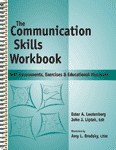Are you an active listener?
Taken from The Communication Skills Workbook by
Ester Leutenberg and John Liptak, EdD
“Do you hear what I hear?” These words from a Christmas carol reminded me of the need to practice active listening. Especially when we are stressed or overtired we find ourselves in conversations and realize that we have not really heard what is being said. Either we are thinking about what we want to say next or we are somewhere else in our mind. Some folks even agree to participating in an activity that they never would have considered had they really been actively listening. (That’s when I learned to be an active listener.)
Active listening is a critical component of any conversation with another person. How hard can it be? After all, we’ve had plenty of practice listening…from the time we are born until we close our eyes for the last time, someone is talking at us. And “talking at us” rather than conversing with us is the case far too often.
What are the barriers to active listening?
- Daydreaming – allowing your attention to wander to other events or people. It is when you stop listening and drift away into your own fantasies.
- Rehearsing – when you are busy thinking about what you are going to say next, so that you never completely hear what the other person is telling you.
- Filtering – when you listen to certain parts of the conversation, but not to all of it.
- Judging – when you have stopped listening to the other person because you have already judged, placed labels, made assumptions about, or stereotyped the other person.
- Distractions – when your attention is divided by something internal to you (headaches, worry, hunger) or external to you (traffic, whispering, others talking).
What can be done to master active listening?
- Paraphrasing – you restate, in your own words, what you think the other person just said. You can use such phrases as “in other words…” or “What I am hearing you say is…”
- Reflection of feelings – you restate what the person has said to you much as you did in paraphrasing. However, you restate what you think the speaker is feeling.
- Clarification – you tell the other person what you thought you heard, learn whether you were right or wrong, and then ask questions to clarify.
- Body Language – you show through your body language that the message you are hearing is one of interest and that you are paying attention to the speaker. You encourage the speaker to tell you more.
Okay then, all of us should easily become active listeners, right? Unfortunately it isn’t that easy to change the habits of a lifetime. Many of us bought into the idea that if you were consistent you could form a new habit in 22 days. That has been proven to be a myth. It actually takes at least 66 days to acquire a new habit. Read this article by James Clear of the Huffington Post to get the details. Choose the barrier to active listening you feel plagues you the most and spend the next two months being consciously aware of your mind slipping away from the conversation to something else. Look the person in the eye so they know you are truly there.
You will find at the end of a couple of months of paying close attention to what is being said active listening will become habit and your conversations both at home and work will be more effective and on point.
This material is adapted from The Communication Skills Workbook by Leutenberg and Liptak.
and Liptak.
